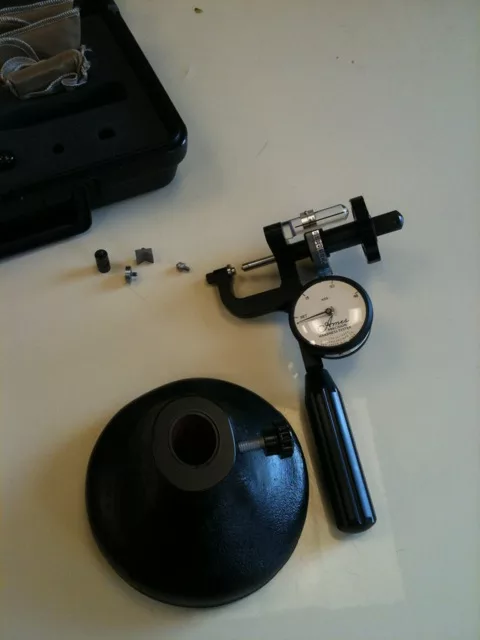Why Quality departments purchase Ames Testers
Quality departments like yours depend on the precision of Ames portable testers. Ames testers are manufactured to follow the ASTM E-110 guidelines. These testers are lightweight and easy to use anywhere. You can count on the accuracy of readings within +/- 1 Rockwell point. Your penetrators, anvils, and test blocks are serialized and traceable to the NIST Standards. You can test inner diameter as well as outer diameter surfaces. This is made possible with our interchangeable penetrators and anvils. Ames testers provide you with the accuracy and repeatability you need. Depend on this instrument to provide you with quick results in every application.

New Tester Kits Contain Everything you Need
When you purchase a new tester, the Ames kit has all the accessories you need to use your tester. You will receive, one diamond and one 1/16” ball Penetrator, extensions, and one each flat and V anvils. Three test blocks are included so you can conduct regular accuracy checks with your tester. This kit is contained in a high-impact carrying case. You also receive the operator’s manual, and certificates of traceability.
Rockwell Scales provide Easy to Read Results
With the standard tester kit, you will be able to test the following Rockwell scales: A, B, C, D, F, G. With 1/8”, ¼”, and the ½” ball penetrators. You can use the same tester to test in the Rockwell scales; E, H, K, L, M, P, R, S, and V. All test results are read directly from the tester with no charts or conversion tables needed. You may also want to consider purchasing a bench stand with your Ames tester, this enables you to use both hands while testing material hardness.
Superficial Testers Allow you to Test Very Thin Materials
Ames superficial testers follow the same ASTM E-110 guidelines as our standard testers. With the lighter minor loads, the tester is able to read shallow case hardened parts, hard thin materials, cemented carbides, and plastics. This tester reads in Rockwell scales N, T, W, X, and Y. Take readings on materials as thin as .006″ with the superficial tester without damaging the material. Superficial testers leave a much smaller indent than the standard testers.